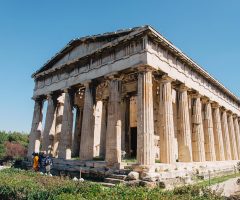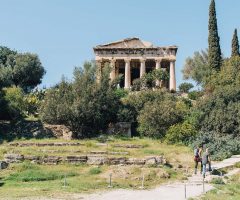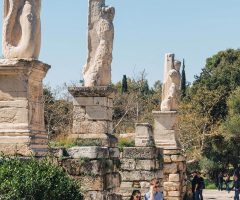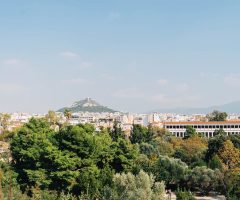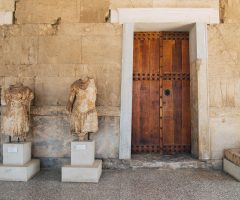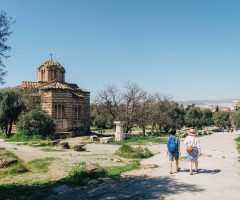The Ministry of Culture and Sports (YPPOA) is responsible for the vast cultural heritage of Greece. This includes the country’s archaeological sites and modern (post-1830) monuments, museums, movable and immovable cultural assets, underwater monuments, cultural buildings and historic sites (Law 3028/2002).
The Ministry of Culture and Sports with its competent Directorates, Services and Councils, is responsible for issuing filming permits (for cinematic and other audio-visual productions) for archeological sites, museums, monuments and historical sites in Greece.
The filming permit is granted after the relevant application form is submitted by the interested parties.You can find the application form for filming permits here:
https://www.culture.gov.gr/en/service/SitePages/view.aspx?iID=2691
The following information is required to complete the application form for a filming permit in Museums, Monuments, Archaeological Sites and Historic Sites:1. The full details of the natural or legal person (name/suranme, postal address, telephone, e-mail), in whose name the permit and the document for the collection of the fees will be issued, including the tax details, as well as the name of the person responsible for the produciton.2. Purpose of filming 3. A synopsis of the script in Greek or English, as well as a description of the scenes that will be shot in the specific areas, in the case of a fiction film or a commercial or TV production (excluding news programs). In case of a documentary, a description of the action of the script without dialogues (treatment) is submitted.4. List of the crew and description of the technical equipment to be used, as well as any description that facilitates the understanding of the shooting conditions.5. Detailed list of filming dates per monument / space / museum.6. Solemn declaration that the terms of this decision will be observed.7. Solemn declaration that the applicant will pay the corresponding VAT in terms of payment of fees.8. Certificate / solemn declaration for the amount of the production budget and the crew list for the whole production.9. In the case of fiction films, commercials, TV productions (excluding news programs) and documentaries, an additional Certificate provided by the Greek Film Centre is required, documenting that the script or the treatment does not promote violence, racism or sexism and does not violate current Greek law and human rights (please, read below). The application for a filming permit is sent to the Services of the Ministry of Culture and Sports as follows:1. For filming in a monument/s, archeological site/s, historical place /s, museum/s that fall within the competence of the same Service of the Ministry of Culture, the interested party submits an application to the electronic address of the competent Service of the Ministry of Culture (i.e. Ephorate of Antiquities, Service of Modern Monuments and Technical Works or Museum).
https://www.culture.gov.gr/en/ministry/SitePages/viewyphresia.aspx?iID=1304
2. For filming in more than one monument, archeological sites, historical sites or museums that fall under the responsibility of different Services of the Ministry of Culture, the interested party submits an application to the General Directorate of Antiquities and Cultural Heritage (GDAPK) to the following email: [email protected].
3. For the filming of a monument registered in the List of World Heritage Sites (UNESCO) and if there are special reasons for the protection of the monument, the request is forwarded by the competent Directorates of the Ministry of Culture to the Central Archaeological Council (KAS) or the Central Council of Modern Monuments (KSNM). In these cases, the decision on the request is issued by the Minister of Culture and Sports, after the opinion of the competent Council. In case of a request examined by the Central Archaeological Council (KAS) or the Central Council of Modern Monuments (KSNM), the interested party has the right to attend the meeting. Relevant instructions can be given by the Hellenic Film Commission of Greek Film Centre.
Certificate confirming the absence of violence, racism and sexism provided by the Hellenic Film Commission of the Greek Film Centre.
In accordance with Decision Β1138 (Gov. Gazette: 10.4.12), in the case of filming in archaeological and historical sites, the Hellenic Film Commission provides the CERTIFICATE issued by the Greek Film Centre (GFC) to confirm that the script of the production in question does not promote violence, racism or sexism and is not in breach of any legislation in force in Greece. The CERTIFICATE has then to be submitted to the Ministry of Culture and Sport as part of the application process for the required filming permit
In order to issue a Certificate confirming the absence of violence, racism and sexism the Hellenic Film Commission requires the following information:
- The title of the audio-visual project
- The script (in Greek or English)
- The name of the director
- The name of the producer and production company and/or production manager and/or location manager
- The country of production
- Precise filming locations and dates
Please email this information to: [email protected], [email protected], [email protected]
Relevant Legislation:
- The Ministerial Decision with Reference Number ΥΠΠΟΑ/ΓΔΑΠΚ/ΔΙΠΚΑ/ΤΠΚΑΧΜΑΕ/356481/254593/7509/2927 (Government Gazette Issue B΄ 2812/04.07.2019.
- The Joint Ministerial Decision with Reference Number ΥΠΠΟΤ/ΔΟΕΠΥ/ΤΟΠΥΝΣ/126463/28-12-2011 (Government Gazette Issue 3046/Β/30.12.2011).
The Ministry of Culture and Sports has posted application forms for filming permits, for the use of images, cinematography and photography of museums, archeological sites and monuments on its official website:https://www.culture.gov.gr/en/service/SitePages/view.aspx?iID=2691

